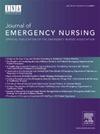Identifying Key Competencies for Ambulance Nurses in Italy: Findings from a Modified Delphi Study
IF 2.3
4区 医学
Q2 EMERGENCY MEDICINE
引用次数: 0
Abstract
Introduction
Prehospital emergency nursing is a critical domain requiring specialized competencies and robust clinical preparation. Nurses in this sector manage high-complexity situations necessitating a broad range of competencies. This study aimed to identify and validate the essential competencies required for specialized ambulance nurses in Italy using a modified Delphi methodology.
Methods
A Delphi study was conducted with a panel of 10 experts, including clinical practitioners and academic professionals. The study involved 2 rounds of questionnaires designed to gather and refine expert opinions on the competencies necessary for ambulance nurses.
Results
The experts identified a comprehensive set of 77 competencies across various domains, emphasizing advanced clinical competencies, decision-making abilities, communication, interpersonal competencies, and leadership. The first round highlighted 31 competencies from clinical experts and 46 from academic experts, with significant overlaps and some divergences. The second round achieved high consensus on many competencies, though some areas, such as holistic and spiritual competencies, showed varied levels of agreement.
Discussion
The identified competencies underscore the complexity and dynamic nature of prehospital emergency nursing. The results provide a framework for developing targeted training programs to prepare nurses for the demands of this field. Continuing education emerged as a crucial element for maintaining and enhancing competencies in the evolving landscape of emergency health care.
确定意大利救护车护士的关键能力:改良德尔菲研究的结果。
简介院前急救护理是一个关键领域,需要专业能力和扎实的临床准备。该领域的护士需要处理高度复杂的情况,因此需要具备广泛的能力。本研究旨在采用改良德尔菲法确定和验证意大利专科救护车护士所需的基本能力:德尔菲研究由 10 位专家组成,包括临床从业人员和学术界专业人士。研究包括两轮问卷调查,旨在收集和完善专家对救护护士必备能力的意见:结果:专家们确定了 77 项跨领域的综合能力,强调了高级临床能力、决策能力、沟通能力、人际交往能力和领导能力。第一轮突出了来自临床专家的 31 项能力和来自学术专家的 46 项能力,其中存在大量重叠和一些分歧。第二轮对许多能力达成了高度共识,但在一些领域,如整体能力和精神能力,达成了不同程度的一致:讨论:已确定的能力强调了院前急救护理的复杂性和动态性。这些结果为制定有针对性的培训计划提供了框架,使护士做好准备以满足这一领域的需求。在不断变化的急救医疗环境中,继续教育是保持和提高能力的关键因素。
本文章由计算机程序翻译,如有差异,请以英文原文为准。
求助全文
约1分钟内获得全文
求助全文
来源期刊
CiteScore
3.10
自引率
11.80%
发文量
132
审稿时长
46 days
期刊介绍:
The Journal of Emergency Nursing, the official journal of the Emergency Nurses Association (ENA), is committed to the dissemination of high quality, peer-reviewed manuscripts relevant to all areas of emergency nursing practice across the lifespan. Journal content includes clinical topics, integrative or systematic literature reviews, research, and practice improvement initiatives that provide emergency nurses globally with implications for translation of new knowledge into practice.
The Journal also includes focused sections such as case studies, pharmacology/toxicology, injury prevention, trauma, triage, quality and safety, pediatrics and geriatrics.
The Journal aims to mirror the goal of ENA to promote: community, governance and leadership, knowledge, quality and safety, and advocacy.

 求助内容:
求助内容: 应助结果提醒方式:
应助结果提醒方式:


